Solaris (1972): Andrei Tarkovsky's space travel | el viaje espacial de Andrei Tarkovsky
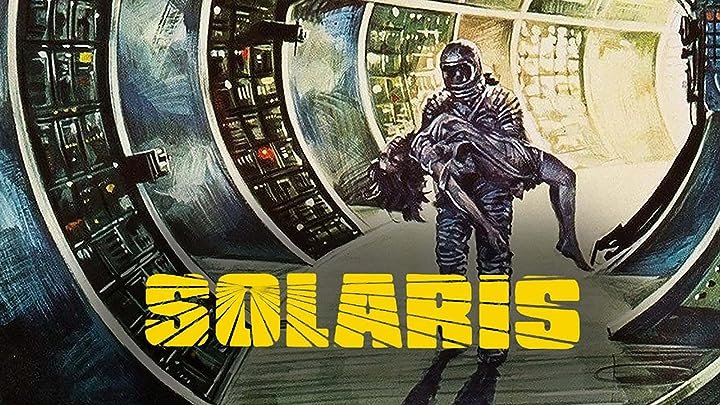
Un clásico de la ciencia ficción
Those who know about cinema know the name of Andrei Tarkovsky, considered one of the most important and influential directors not only in his native Russia but throughout the world. Although I've barely seen a couple of his movies (three with this one) The Mirror left a big impression on me, confirmed when I saw Stalker. Excellent films from every technical and narrative point of view, time, narrative, are films that leave the pleasant sensation of having seen something much closer to Art and the human soul than to the vain entertainment that cinema can be sometimes, especially these days.
Quienes saben de cine conocen el nombre de Andrei Tarkovsky, considerado uno de los directores más importantes e influyentes no sólo en su Rusia natal sino en todo el mundo. Aunque apenas he visto un par de sus películas (tres con esta) The Mirror me dejó una gran impresión confirmada cuando vi Stalker. Excelentes películas desde todo punto de vista técnico y narrativo, el tiempo, la narrativa, son películas que dejan la grata sensación de haber visto algo mucho más cerca del Arte y del alma humana que del vano entretenimiento que puede ser a veces el cine, sobre todo en estos tiempos.
Due to that great previous experience, I added several of Tarkovsky's most notable works to my to-watch list, but among so many other titles and names it had been a while since I saw any of his work again, until I recently read Solaris, the science fiction novel written by the Polish writer Stanislaw Lem, which was made into a film by Andrei Tarkovsky in 1972 in what became known as the Soviet response to 2001: A Space Odyssey, released in 1968. Let's remember that those were the years of the cold war and the space race was an important part of that ideological and political conflict. Tarkovsky's film was made after Kubrick's (another cinema great), Lem's novel is from 1961, but Arthur Clarke's short story on which the iconic 2001: A Space Odyssey is based was written in 1948. In other words, we are talking about several decades of competition, but also of human curiosity to discover what is out there in the stars we see. Satellites in orbit, manned ships, shuttles, space stations, government projects, there were many things that humanity achieved in a few decades in which this same desire to understand our universe inspired great works of universal literature and cinema such as the two a which I have referred to. But I want to talk above all about Tarkovsky's film.
Debido a esa gran experiencia previa, agregué varias de las obras más destacadas de Tarkovsky a mi lista de pendientes, pero entre tantos otros títulos y nombres había pasado un buen tiempo sin volver a ver algo de su trabajo, hasta que leí recientemente Solaris, la novela de ciencia ficción escrita por el escritor polaco Stanislaw Lem, la cual fue llevada al cine por Andrei Tarkovsky en 1972 en lo que se conoció como la respuesta soviética a 2001: A Space Odyssey, lanzada en 1968. Recordemos que eran los años de la guerra fría y la carrera espacial era parte importante de ese conflicto ideológico y político. La película de Tarkovsky se hizo después de la de Kubrick (otro grande del cine), la novela de Lem es de 1961, pero el cuento de Arthur Clarke en el que se basa la icónica 2001: A Space Odyssey fue escrito en 1948. Es decir, estamos hablando de varias décadas de competencia, pero también de curiosidad humana por descubrir que hay allá afuera en las estrellas que vemos. Satélites en órbita, naves tripuladas, transbordadores, estaciones espaciales, proyectos gubernamentales, fueron muchas las cosas que la humanidad alcanzó en algunas décadas en las que este mismo deseo de comprender nuestro universo inspiró grandes obras de la literatura universal y del cine como las dos a las que me he referido. Pero quiero hablar sobre todo de la película de Tarkovsky.
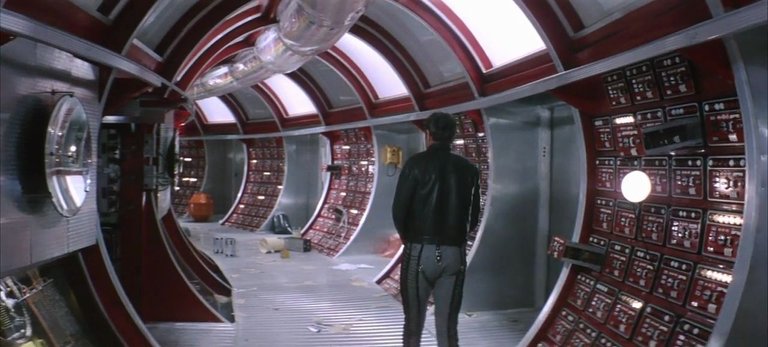
Solaris maintains the same premise as Lem's novel in which a psychologist is sent to a space station to investigate the strange behavior that the crew has been having lately. The station is named after the planet on which it is located and which is the one that gives the work its name: Solaris. A strange planet that has been investigated by the scientific community for decades, but still has not revealed many of its mysteries. In the midst of a crisis in which the government is studying the possibility of abandoning the station and with it the planet, psychologist Kris Kelvin (note his last name) is sent to investigate.
Solaris mantiene la misma premisa de la novela de Lem en la que un psicólogo es enviado a una estación espacial para investigar el extraño comportamiento que la tripulación ha tenido últimamente. La estación lleva el nombre del planeta sobre el cual se encuentra y que es el que le da el nombre a la obra: Solaris. Un planeta extraño que ha sido investigado por la comunidad cientifica durante décadas, pero que aún no revela muchos de sus misterios. En medio de una crisis en la que el gobierno está estudiando la posibilidad de abandonar la estación y con ello el planeta, es que el psicólogo Kris Kelvin (nótese el apellido) es enviado para investigar.
Upon arrival, Kelvin learns that one of the three crew members has committed suicide, which leaves him in the company of the other two scientists, one of whom seems very upset about some strange presences on the space station. I confess that I understood a lot of things and I was able to measure them by having read Lem's novel before, but I don't know if they are clear enough for some viewers who haven't read it. My opinion is that yes, they do explain it enough, but I may be conditioned by my experience. The truth is that at first no one talks to Kelvin about these presences, until he himself receives a visit from his ex-wife Hari. Wait, how did your ex-wife get to the space station? what is happening? It's strange, right? Well, the strangest thing is that Hari died ten years ago. So, we ask ourselves, is this woman real? Yes, it is real and at the same time it is not, is it a product of your imagination? Yes, a little, but it also has materiality: you can touch it, talk to it and others can see it too, how is that possible? That's part of the mystery of the planet Solaris, whose one vast ocean seems to be a living, sentient organism that seeks to communicate with its visitors in ways they still can't understand.
Al llegar, Kelvin se entera que uno de los tres tripulantes se ha suicidado, lo que lo deja en la compañía de los otros dos científicos, uno de los cuales parece muy alterado con repecto a algunas presencias extrañas que hay en la estación espacial. Confieso que muchas cosas las entendí y las pude dimensionar por haber leído antes la novela de Lem, pero no sé si queden lo suficientemente claras para algunos espectadores que no la hayan leído. Mi opinión es que sí, que sí lo explican lo suficiente, pero puedo estar condicionado por mi experiencia. Lo cierto es que al inicio nadie le habla a Kelvin de estas presencias, hasta que él mismo recibe la visita de su ex esposa Hari . Un momento, ¿cómo ha llegado su ex esposa a la estación espacial? ¿qué está sucediendo? Es extraño, ¿cierto? Pues, lo más extraño es que Hari murió hace diez años. Entonces, nos preguntamos, ¿es real esta mujer? Sí, es real y a la vez no, ¿es producto de su imaginación? Sí, un poco, pero también tiene materialidad: la puede tocar, hablar con ella y los demás la pueden ver también, ¿cómo es posible? Eso es parte del misterio del planeta Solaris, cuyo único e inmenso océano parece ser un organismo vivo y consciente que busca comunicarse con sus visitantes de una forma que estos aún no logran comprender.
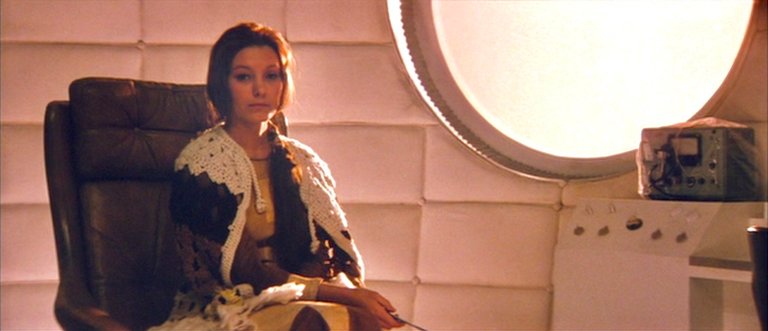
One of the things I like most about these stories, like Lem's and Kubrick's film, is the way in which space travel and other worlds are a pretext to reflect on our own humanity. Yes, they talk of other organisms, of distant universes, of spaceships, but what is being explored is the human soul, its limits, its capacities, its desires and fears. A phrase that is in the book and whose idea is mentioned in the movie says "We don't need other worlds. We need mirrors" and I think it's true.
Sci-fi classic, one of the most important Russian films by one of the greatest directors of all time, at times a love story, Solaris is a must-watch if you are interested in the seventh art. I haven't seen Steven Soderbergh's version of 2002, starring George Clooney and although I think modern technology can play in favor of certain images, I also feel that modernity would not be able to reflect the spirit of the times, so I don't know If I'm gonna see it, have any of you seen either of them? Have you seen any other Tarkovsky movies? I read you in the comments.
Una de las cosas que más me gusta de estas historias, como la de Lem y la película de Kubrick, es la forma en que los viajes espaciales y los otros mundos son un pretexto para reflexionar sobre nuestra propia humanidad. Sí, se habla de otros organismos, de universos distantes, de naves espaciales, pero lo que se está explorando es el alma humana, sus límites, sus capacidades, sus anhelos y temores. Una frase que está en el libro y cuya idea mencionan en la película dice "No necesitamos otros mundos. Necesitamos. espejos" y creo que es cierto.
Clásico de la ciencia ficción, una de las películas rusas más importantes de uno de los directores más grandes de todos los tiempos, por momentos una historia de amor, Solaris es una película que debe visitarse si se está interesado en el séptimo arte. No he visto la versión de Steven Soderbergh de 2002, protagonizada por George Clooney y aunque creo que la tecnología moderna puede jugar a favor de ciertas imágenes, también siento que la modernidad no sería capaz de reflejar el espíritu de la época, así que no sé si la vea, ¿alguno de ustedes ha visto alguna de las dos? ¿han visto alguna otra películas de Tarkovsky? Los leo en los comentarios.
Reviewed by | Reseñado por @cristiancaicedo
Other posts that may interest you | Otros posts que pueden interesarte:
 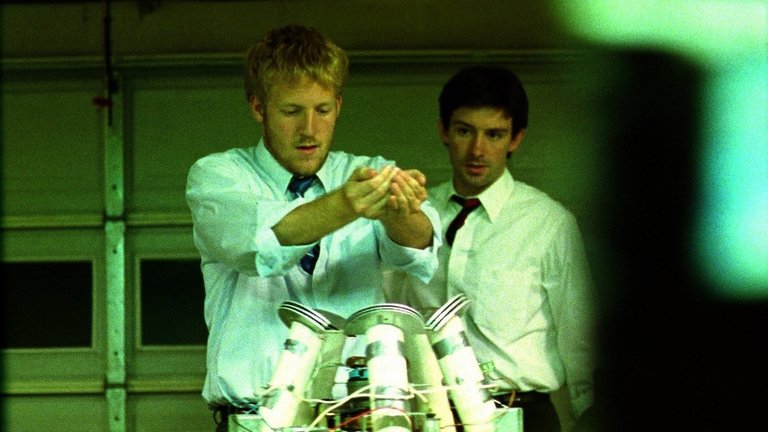 |
|---|
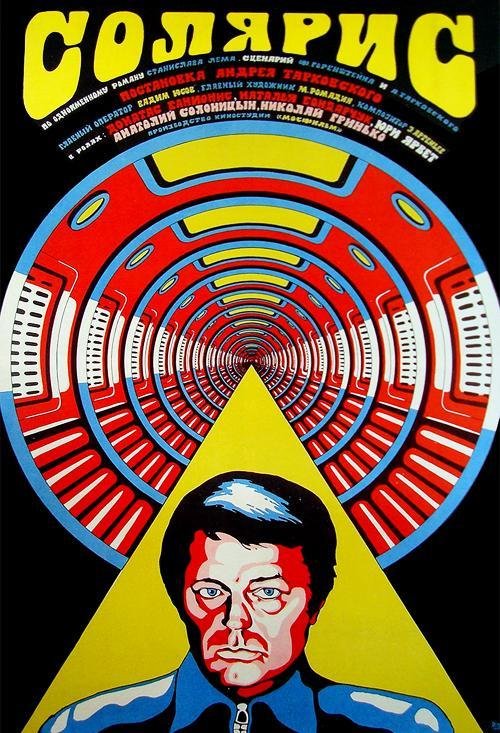


Tarkovski es, indudablemente, uno de los cineastas más importantes; un cineasta fuera de serie, de culto, diría: denso, inteligente, profundo... Y Solaris uno de sus filmes de mayor atracción. Hace mucho tiempo pude comprar copias en DVD de casi toda la filmografía de Tarkovski; mi preferida es Andrei Rubliov. Gracias por tu excelente reseña de Solaris y por traernos de nuevo a Tarkovski. Saludos, @cristiancaicedo.
Muchas gracias por su valoración y comentario. Justo le iba a preguntar por su favorita del director. Voy a ver esa y le haré una reseña. Saludos.
Que esperas para unirte a nuestro trail de curación y formar parte del "proyecto CAPYBARAEXCHANGE", tu casa de cambio, rápida, confiable y segura